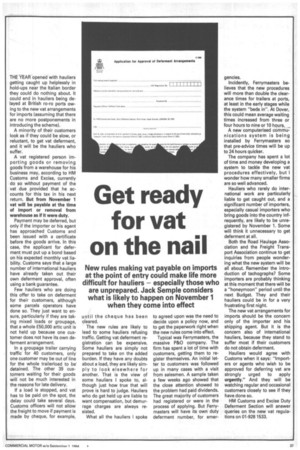Get ready for vat on the nail
Page 39

If you've noticed an error in this article please click here to report it so we can fix it.
New rules making vat payable on imports at the point of entry could make life more difficult for hauliers — especially those who are unprepared. Jack Semple considers what is likely to happen on November 1 when they come into effect
THE YEAR opened with hauliers getting caught up helplessly in hold-ups near the Italian border they could do nothing about. It could end in hauliers being delayed at British ro-ro ports owing to the new vat arrangements for imports (assuming that there are no more postponements in introducing the scheme).
A minority of their customers look as if they could be slow, or reluctant, to get vat deferment, and it will be the hauliers who suffer.
A vat registered person importing goods or removing goods from a warehouse for his business may, according to HM Customs and Excise, currently do so without payment of the vat due provided that he accounts for this tax in his next return. But from November 1 vat will be payable at the time of import or removal from warehouse as if it were duty.
Payment may be deferred, but only if the importer or his agent has approached Customs and been issued with a certificate before the goods arrive. In this case, the applicant for deferment must put up a bond based on his expected monthly vat liability. Customs says that a large number of international hauliers have already taken out their own deferment approval, often using a bank guarantee.
Few hauliers who are doing this offer to take on deferment for their customers, although some parcels operators have done so. They just want to ensure, particularly if they are taking mixed loads or groupage, that a whole £50,000 artic unit is not held up because one customer does not have its own deferment arrangement.
In a groupage trailer carrying traffic for 40 customers, only one customer may be out of line for the whole trailerload to be detained. The other 39 customers waiting for their goods will not be much interested in the reasons for late delivery.
If a load is stopped, and vat has to be paid on the spot, the delay could take several days. Customs officers will not allow the freight to move if payment is made by cheque, for example, until the cheque has been cleared.
The new rules are likely to lead to some hauliers refusing traffic. Getting vat deferment registration can be expensive. Some hauliers are simply not prepared to take on the added burden. If they have any doubts about a load, they are likely simply to look elsewhere for another. That is the view of some hauliers I spoke to, although just how true that will prove is hard to judge. Hauliers who do get held up are liable to want compensation, but demurrage charges are always resisted.
What all the hauliers I spoke to agreed upon was the need to decide upon a policy now, and to get the paperwork right when the new rules come into effect.
Typical was Ferrymasters, the massive P&O company. The firm has spent a lot of time with customers, getting them to register themselves. An initial letter to customers was followed up in many cases with a visit from salesmen. A sample taken a few weeks ago showed that the close attention showed to the problem had paid dividends. The great majority of customers had registered or were in the process of applying. But Ferrymasters will have its own duty deferment number, for emer gencies.
lncidently, Ferrymasters believes that the new procedures will more than double the clearance times for trailers at ports, at least in the early stages while the system "beds in". At Dover, this could mean average waiting times increased from three or four hours to nine or 10 hours._ A new computerised commun icatio ns system is being installed by Ferrymasters so that pre-advice times will be up to 24 hours quicker.
The company has spent a lot of time and money developing a system to tackle the new vat procedures effectively, but I wonder how many smaller firms are so well advanced.
Hauliers who rarely do international work are particularly liable to get caught out, and a significant number of importers, especially casual importers who bring goods into the country infrequently, are likely to be unregistered by November 1. Some will think it unnecessary to get deferment at all.
Both the Road Haulage Association and the Freight Transport Association continue to get inquiries from people wondering what the new system will be all about. Remember the introduction of tachographs? Some importers are probably thinking at this moment that there will be a "honeymoon" period until the next Budget. They and their hauliers could be in for a very frustrating first night.
The new vat arrangements for imports should be the concern only of the importer and his shipping agent. But it is the concern also of international hauliers, because they stand to suffer most if their customers do not obtain deferment.
Hauliers would agree with Customs when it says: "Importers or agents who wish to be approved for deferring vat are strongly urged to apply urgently." And they will be watching regular and occasional customers closely to see if they have done so.
HM Customs and Excise Duty Deferment Section will answer queries on the new vat regulations on 01-928 1533.




















































































